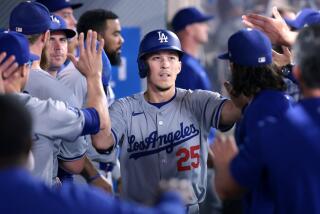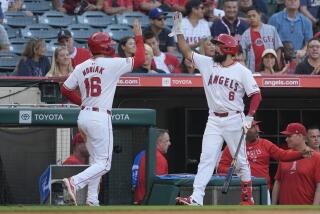A Tall Order : Steve DeAngelis Tries to Prove He’s Big Enough for Majors
- Share via
Just when Steve DeAngelis thought he had overcome all the supposed obstacles to making the major leagues, it appears the Philadelphia Phillies will throw another roadblock in his path.
Despite starring at Temple City High School and Saddleback College, many baseball scouts thought DeAngelis, who is 5-foot, 9 1/2-inches, was too small to play pro ball.
They also thought the use of aluminum bats contributed to many of his statistics (nine home runs and 37 RBIs in his senior year of high school, 28 homers and 114 RBIs in two years of community college) and that he wouldn’t be able to generate such power in the pros with a wood bat.
DeAngelis showed them.
In less than two professional seasons, the 22-year-old outfielder has risen from a reserve player at the Class-A level to a power hitter at the Triple-A level and now leads the Pacific Coast League’s Portland Beavers in doubles (24) and home runs (14).
But when teams are allowed to expand their rosters from 24 to 40 next Monday, DeAngelis probably won’t be among the players promoted to the Phillies--even though his performance may warrant a shot at the major leagues, and even though the organization would love to test him against some big-league pitching.
This time, DeAngelis, according to a Phillie executive, may simply fall victim to a prudent business decision.
If the Phillies called DeAngelis up, they would have to protect him over the winter so that no other team could select him in the major league draft. All three-year players--in the big leagues or the minors--who are not protected on the 40-man roster may be drafted by any major league club during the winter meetings for $50,000.
But because DeAngelis is a two-year player, the Phillies would not have to protect him if they kept him in Triple-A. By leaving him at Portland, the team can call up another three-year player to protect and still be assured of keeping DeAngelis, one of their top prospects, in their system.
For the Phillies, it would be a wise move, one that is based on experience. In 1980, the Phillies left George Bell--then a minor league player--unprotected, thinking no other teams would take him.
The Toronto Blue Jays did, and Bell become a star outfielder. This season he is among the American League leaders in home runs (27) and RBIs (91). “We learned our lesson a long time ago,” said Hugh Alexander, player personnel adviser for the Phillies. “We thought about bringing Steve up on Sept. 1, but we might not for that very reason (the major league draft). If we had room, we’d bring him up to see how he’d do against big-league pitching.”
That wasn’t much consolation to DeAngelis.
“I think it stinks,” he said by telephone from Las Vegas, where the Beavers were playing the Stars. “If a guy’s ready to go up and play, they should bring him up.”
Once DeAngelis had a moment to consider the factors, though--the team’s point of view, the fact that he is just completing his second season in the pros and the month’s rest he could use to help two dislocated fingers on his left hand heal--he cooled down considerably.
“I’m not gonna let that bother me,” DeAngelis said. “It’s only a month, anyway, and I’m in no rush. As long as I go to spring training next year, I’ll be happy.”
Few thought DeAngelis would even get this far. In his senior year at Temple City, the left-hander won the Rio Hondo League triple crown with a .551 average, 9 homers and 37 RBIs, but he didn’t leave much of an impression on the scouts.
He wasn’t even drafted.
“That was disappointing,” DeAngelis said.
In his first year at Saddleback, he hit 11 homers to break current Montreal Expo Tim Wallach’s school record. He also set school records for RBIs (50), hits (61) and runs (51), had seven triples and stole 17 bases in 18 attempts.
Again, DeAngelis wasn’t drafted.
“That was a shocker,” he said.
DeAngelis was finally selected by Toronto in the ninth round of the January, 1984 draft, but he chose to finish his career at Saddleback, where he set single-season records for homers (17), doubles (13) and RBIs (64) in 1984.
That spring, he weighed scholarship offers from about 25 schools against a signing offer from the Phillies, who drafted him in June, and elected to attend Oklahoma State.
He hit third, in front of Pete Incaviglia, for the Cowboys in the fall of 1984 but dropped out of school in March, 1985--before the regular season--to sign with the Phillies.
“I just didn’t want to go to school no more,” DeAngelis said. “I never liked school. The only reason I went to school was to play baseball.”
DeAngelis knew from the moment he stepped onto a Little League field in Arcadia that he wanted to play pro ball, and his incentive was boosted even further when he was snubbed by the pros after high school.
DeAngelis embarked on a weight training program at Saddleback that improved his strength and bulked up his arms and chest.
The end result was something of a left-handed Toy Cannon--a compact-model slugger.
DeAngelis’ first stop in pro ball was Clearwater, the Phillies’ Class-A affiliate in the Florida State League. He didn’t start until the sixth week of the season, when Manager Ramon Aviles decided to give DeAngelis a shot as a full-time player.
He took full advantage, hitting three home runs that week and went on to hit .271 with 32 doubles, 16 homers and 86 RBIs.
DeAngelis was promoted to Double-A Reading (Pa.) to start the 1986 season but lasted only 30 games in the Eastern League. After hitting .352 with 8 homers and 28 RBIs, he was promoted to Portland in late May.
DeAngelis happened to arrive in Portland at the same time as Alexander, who was there to look at a few pitchers. Instead, it was DeAngelis who caught his eye.
In the four games Alexander saw, DeAngelis hit three home runs--one to left field, one to right field and one over the 25-foot center-field fence, which is 405 feet from home.
“He put on quite a show for me,” Alexander said.
DeAngelis had been hitting .280 for most of the season until he dislocated his index finger sliding into second about a month ago and his thumb sliding into home three weeks ago. His average has dipped to .258 and he has 57 RBIs.
Alexander, however, remains impressed.
“Being a left-handed power hitter, he’s gonna be in the major leagues pretty quick,” Alexander said.
Well . . . maybe not that quick.
More to Read
Go beyond the scoreboard
Get the latest on L.A.'s teams in the daily Sports Report newsletter.
You may occasionally receive promotional content from the Los Angeles Times.










